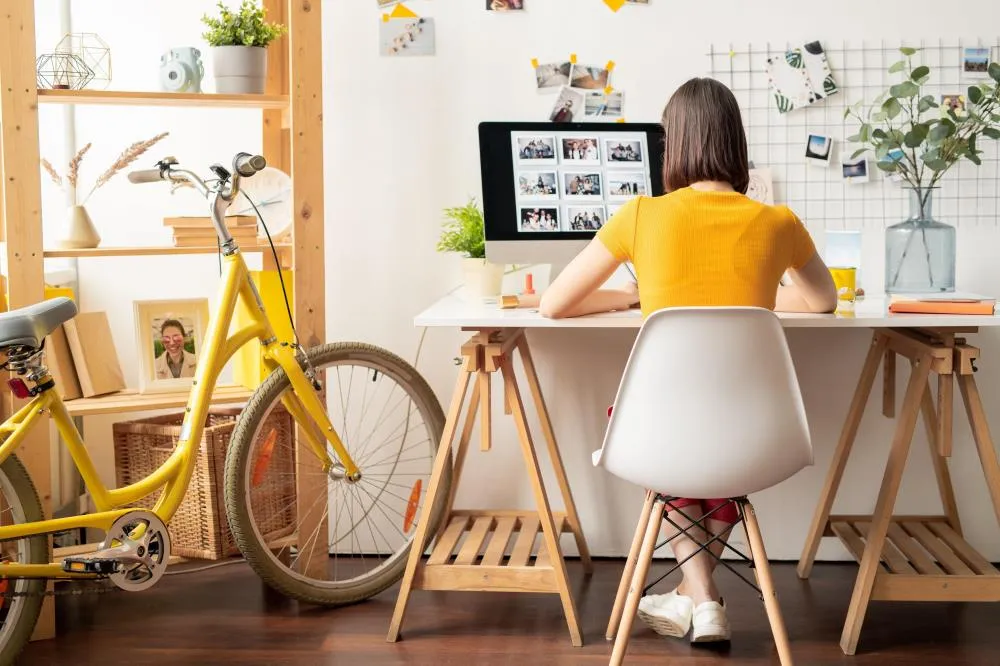Flexible Working at Orbital
What does 'flexible working' actually look like at our company?

April 20, 2022

We’re hiring! Explore our Product Engineering Guide to learn how we build at Orbital.
Note: This post was written in 2022, but our philosophy on flexible working hasn’t changed—it’s still how we operate today.
Clarifying the ambiguity
Remote working, working from home (WFH), hybrid working, flexible working, cross-border working, mandatory days, offsites, in-person, distributed… on and on the list goes 🤔. There’s a plethora of ways companies and employees are defining how they want to work and what’s expected of everyone while at work. Depending on your previous work environment or what you’ve read about how other people are “working flexibly”, it can mean many different things to different people at different times.
Having a blanket policy that works in all situations for all people is difficult to say the least. Instead of having such a policy that covers all possible scenarios, we instead took the approach to gather feedback from employees and combine that with what we value and want to foster as a company long-term. From this more organic approach, a set of day-to-day flexible working practices have emerged which employees find works well for them both personally and professionally. This blog post aims to highlight many of those flexible working practices; both to codify them for our own internal use but also to share them with potential future employees who want a sneak peek into how we work.
Asking employees for their feedback
In May 2021, while the UK was still under a partial lockdown, we surveyed employees about what they’d like to see in the next 6 months in terms of flexible working. We wanted to use the responses to create a consistent company policy that worked for everyone. We wanted to learn more about what we had been hearing from some employees: that they were missing elements of a working environment when forced to work from home for long periods of time during the pandemic. Here are the survey results off the back of asking everyone in the company this question: Over the first 6 months from lockdown lifting (21 June, 2021), how many days a week, on average, would you ideally want to be in the office?:
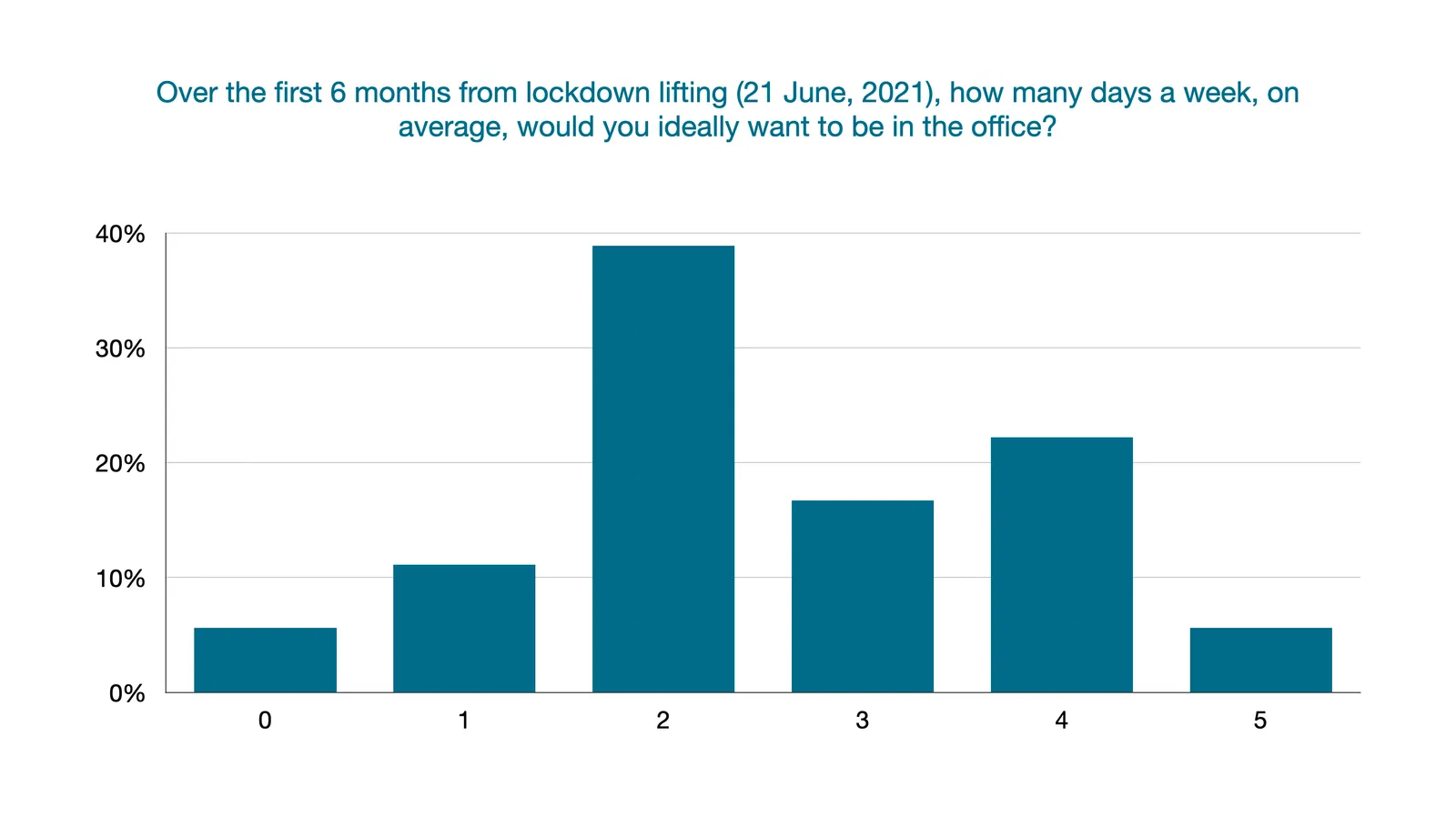
Along with collecting the quantitative data above 📊, we asked a few follow-up questions about what people value most about working from home and working in the office to help us understand how we could foster the right working environment for both settings. We created the word clouds seen below from everyone’s responses which showed us the different aspects of each environment that are valued by our current employees (the bigger the word, the more often it was mentioned by everyone):
| Reasons for working from home | Reasons for working in the office |
|---|---|
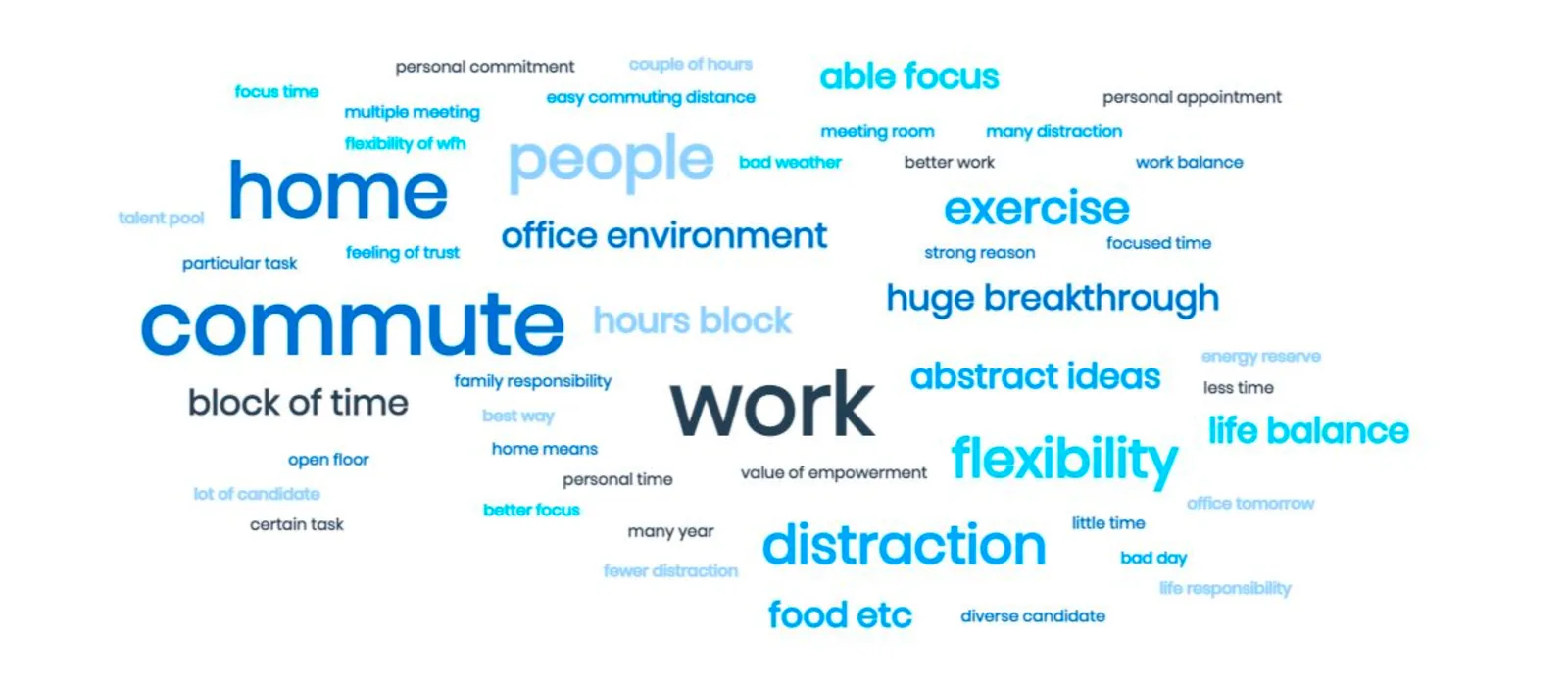 | 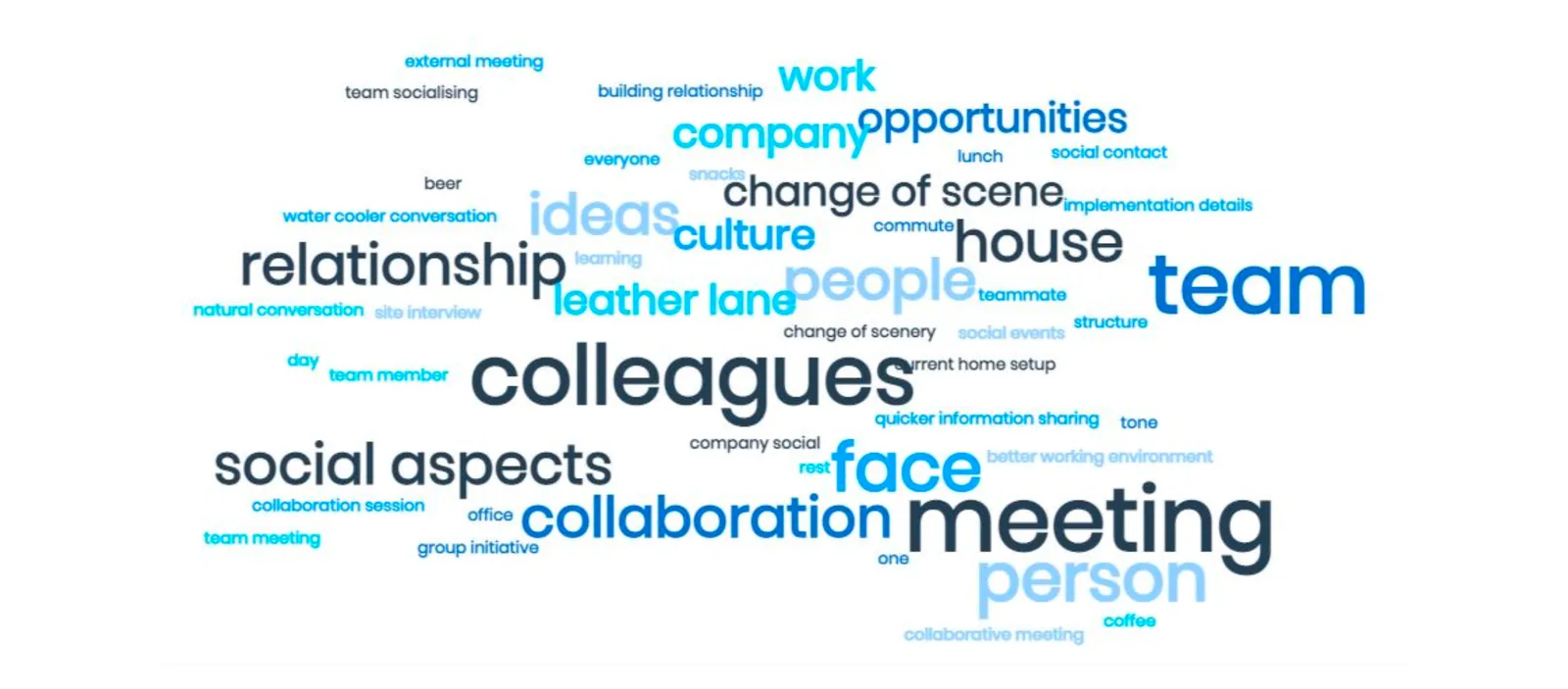 |
What we value and what we’re trying to foster
At the heart of our culture and values - most notably, Power to Our People - is the trust we place in our employees. We enjoy giving everyone both the autonomy to decide which work environment is the most conducive for them to do their best work, and the flexibility 🧘♀️🙆♂️ to put this into practice today, tomorrow or in the future.
At the same time, we also want to foster a thriving, collaborative, and pleasant working environment for those employees that have a specific need or desire for home or office working. Each team and each person works differently depending on their needs. Sometimes, the number of days worked from home or in the office may be a consistent trend, but it may also become sporadic and less predictable due to personal circumstances or the nature of the specific project they’re working on. The guiding principle we follow when allowing for flexibility is Customers => Colleagues => Self. This means that if we are ever in doubt about what to prioritise then whatever is best for the customer comes first, followed by what’s best for our colleagues as a team, followed by what’s best according to one’s personal preferences. This principle irons out most issues and allows everyone to work as flexibly as they need according to their task(s) while aligning everyone to what’s most important for the business to continue thriving.
The desire for flexibility was not only evident in much of the survey data shown previously, but also in one-on-one meetings with colleagues and in interviews where we listened 👂 to what potential candidates wanted in their future work setup and/or thought were missing from their current work environment. Pretty much everyone loves the comfort, convenience and solitude that home working provides but they also miss the structure/routine, contact with colleagues, and dynamism that multiple colleagues in an office can provide. At Orbital we wanted to have our cake and eat it too 🍰 and therefore we actively foster the ability for any employee to choose either working option - on any given day. Sometimes people choose both options on the same day such as working from home in the morning and from the office in the afternoon!
Everyone is different and therefore requires a different setup to be productive and happy at their job. A 25 year old living in a cramped London flatshare 🏢 may need the respite and space provided by a quiet office environment with meeting rooms. However, a parent of two little ones 👶🧒 needing to conduct the school drop-off may find working from home or simply some more flexible time in the mornings really helpful to start the day off on the right foot. Then there’s also those times where someone just needs to find the time and space to get into the zone and spend hours of uninterrupted time solving a hard technical problem.
An added little bonus of working at Orbital is that we currently have an office in a building operated by The Office Group (TOG) which is similar to a WeWork concept. Because of this affiliation with TOG, every Orbital employee not only has their own home and our usual permanent office environment in Clerkenwell to work from but also 40+ TOG buildings throughout London (and even more offices in other cities in the UK and Europe) which they have access to with their TOG key card.
What’s actually happening day-to-day
Flexible days of the week
There isn’t a set number of days we ask everyone to be in the office and instead allow for more of an organic approach. So what’s actually going on in a given week? Here is data taken from our Officely Slack App which collects self-reported data from employees about when they’re coming into the office. Colleagues use Officely each week to inform everyone else about when they might be coming into the office on a specific day. Officely helps us all to more effectively coordinate meetings and have impromptu meetups between colleagues in the same team or across teams. Officely has been really helpful to make sure more of our one-on-one meetings happen in person over a coffee ☕️, while our communal lunches spill over many tables and after-work pub get-togethers with colleagues are a staple. Clearly, Wednesdays and Thursdays are good days to coordinate those things, with Friday being a little less busy:
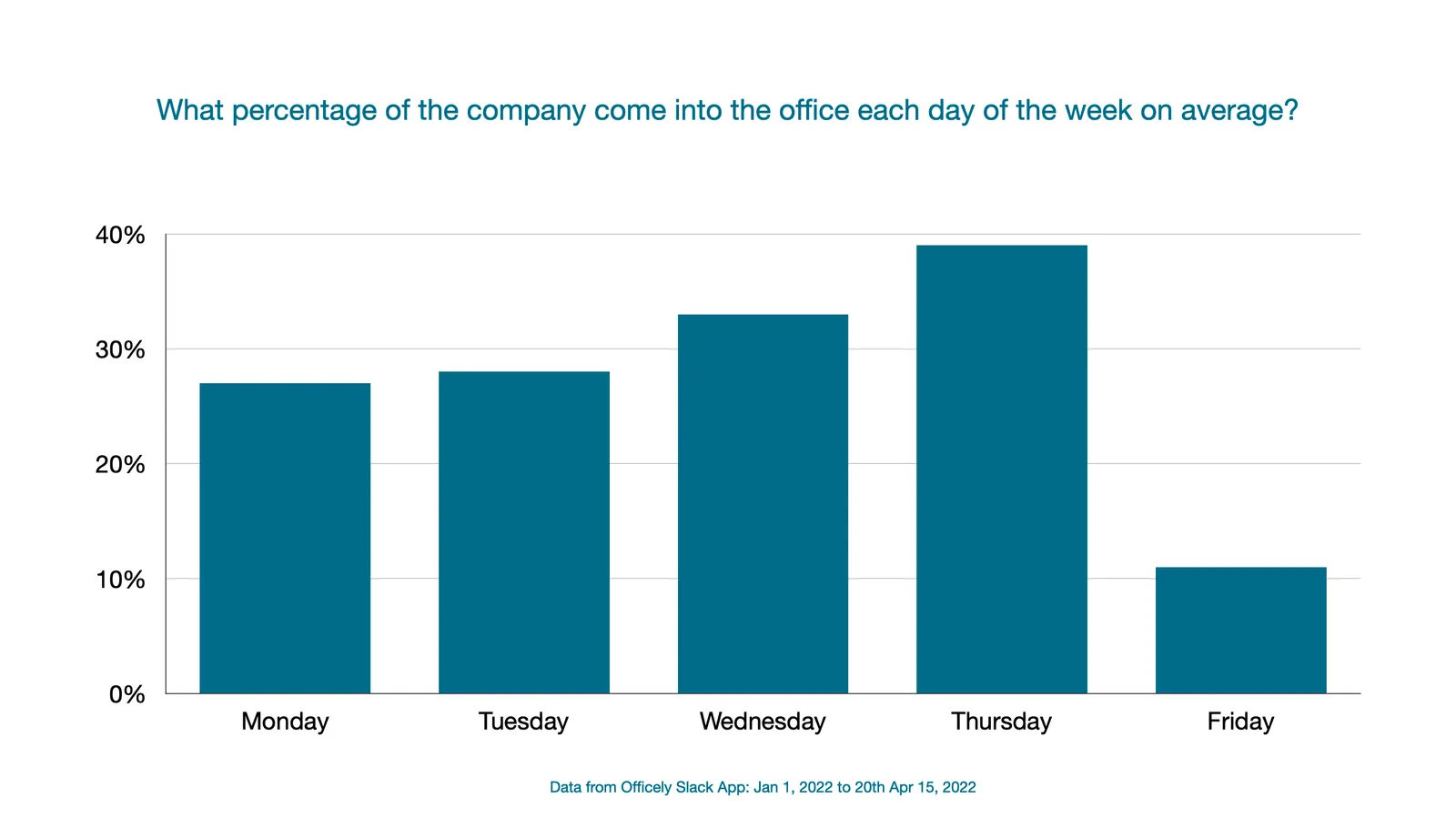
Flexible location
The vast majority of employees at Orbital are based in and around London with a few people as far flung as the seaside 🌊 in Kent and the countryside 🏕 near Bristol and Cardiff 🏴. As such, most employees come into the office on a weekly/fortnightly basis for a few or more days. Those who are more far flung come into the office monthly/bi-monthly for a few days at a time, often for our company all-hands once a month. We even have some colleagues who come into the office most of the week because they like the routine and structure of it. To summarise, there’s a complete mix of what people currently do and hence this is why we value continuing to have that flexibility. Our feedback and surveys show that it’s working well both in terms of productivity and employee happiness; therefore, we’d like that to continue 😊.
Given that we’re trying to foster both flexibility and an in-office culture, we’ve deliberately decided not to seek out fully remote colleagues who are not able to come into the office at all. We’re not dogmatic about this and will make the odd exception to the rule, but in the long-term we want to have a company with a healthy segment of employees who work and socialise in-person on a regular basis, especially while our teams grow and our culture evolves.
Flexible working hours
Our core working hours are 9:00am to 5:30pm but we’re not overly pernickety about following this and we certainly don’t monitor it. Many of the teams have stand-ups that begin at 9:30am and so long as people communicate effectively about when they might not be available during core hours, everyone is free to hop off to a doctor’s appointment or gym session throughout the day. Again, the reason for this is to give everyone flexibility; we fully trust our colleagues to balance both their personal and professional lives and everyone does just that. The reason we’re comfortable with this approach is that, from a management perspective, we follow what Andy Grove famously wrote about in his book, High Output Management, where he said measure output not activity. At Orbital, we are also far more concerned with what output is being generated by a team/individual rather than tracking the activity or amount of time that produced it. As a result, we care less about the hours worked and more about the value we’re continuously shipping to our customers.
Company get-togethers
Once a month, we have our company All Hands meeting where we go over key performance metrics of the company, discuss one important topic that matters most and often have a fireside chat with a customer, investor, or industry leader. We’re always set up virtually for these meetings so that those who are working from home can participate. However, for the day of the All Hands, we encourage everyone across the company to be in the office where we have lunch together, schedule collaborative meetings within teams and have the company-wide All Hands meeting. Afterwards, we often have a planned social in the evening which has ranged from canoeing 🛶 Hackney Wick canal (and sometimes falling in) to competing in epic two-on-two ping pong 🏓 battles at Bounce to baking and decorating a Great British Bake Off style cake 🍰 in teams of two (and then devouring the cake before we’ve even got home for the night).
Other small niceties
Dogs in the office
Many colleagues decided to get a new family member during the pandemic 🐕 🐩 🦮 and we applauded them for it. We know how important dogs can be for many people and how much love and attention they need during the day. Because of this, people have the option to bring their dog into the office on select days so long as their furry friend is well trained and doesn’t disturb others who are hard at work. We created a little system so dog owners and some colleagues (who for various reasons may not want to be around dogs in the office) can easily coordinate which day(s) dogs may be in the office and everyone can work around this with little hassle.
Video-first meetings
The entire company has weekly stand-ups (Monday mornings) and stand-downs (Friday afternoons) where we briefly talk about the week ahead and/or what was accomplished, the tracking of our OKRs, and any big events/happenings that week. It’s a good touchstone for everyone to see the entire company each week and get a sense for what’s going on. Each team usually has a separate stand-up each day (focused on the specific details of their work) as well as other ad hoc product, design, engineering and/or one-on-one meetings. All of our meetings are set up so that colleagues can either video conference in 🧑💻 or be in the office around a single screen 📺 with good audio quality. As such, most people keep their cameras on as it’s nice to see everyone’s face during these meetings (unless of course people happen to be eating 🍔 or are having a bad hair day 👱♀️).
Working remotely for a period of time
We have a very international team and that means people’s families and loved ones are spread far and wide across the globe. Coming out of the pandemic, when travel was allowed again, it was vital that everyone was given the opportunity to see their family if they wanted or needed to. We had several colleagues fly off to their home countries such as Croatia 🇭🇷, Brazil 🇧🇷, Malaysia 🇲🇾 and Hungary 🇭🇺 for extended periods of time where they both took holidays and worked remotely for a number of weeks. This allowed them to spend much needed time with family and friends who they hadn’t seen for some time, while also enabling them to continue working on their projects without using up all their holiday allowance in one single shot. We have to be a bit careful to make sure everyone abides by UK tax laws (which dictate how much time someone can work outside the UK while being on a UK payroll), but so long as that’s satisfied, employees wanting to work abroad for up to 8 weeks a year is something that we support. We just ask that employees continue to overlap with the core working hours of their team. If you’re from France that’s a pretty easy trade-off but it can be more difficult the farther afield you travel (depending of course on your tolerance for changing when your work day starts and ends). Having said that, even one of our tech leads, who recently went to visit family and friends in Malaysia 🇲🇾, and one of our senior engineers, who recently went to Brazil 🇧🇷, didn’t mind too much about starting work in the late afternoon or early morning (respectively) to accommodate this.
The future is adaptable
Each team that works closely together is frequently fine-tuning their meetings and work practices to make sure they’re a good fit for everyone in the team. A team environment needs structure but also adaptability and we try to promote both. Our style of working, as mentioned above, highlights our core values around flexibility. In the future, things may change and our working practices may require further adjusting both as employee headcount grows but also as people’s expectations and wants/needs change. As a bold, ambitious and inclusive company, Orbital aims to keep ahead of this curve by continuously speaking with current and future employees and adapting how we work best, while always putting first how we can maximise the value we deliver to our customers.
